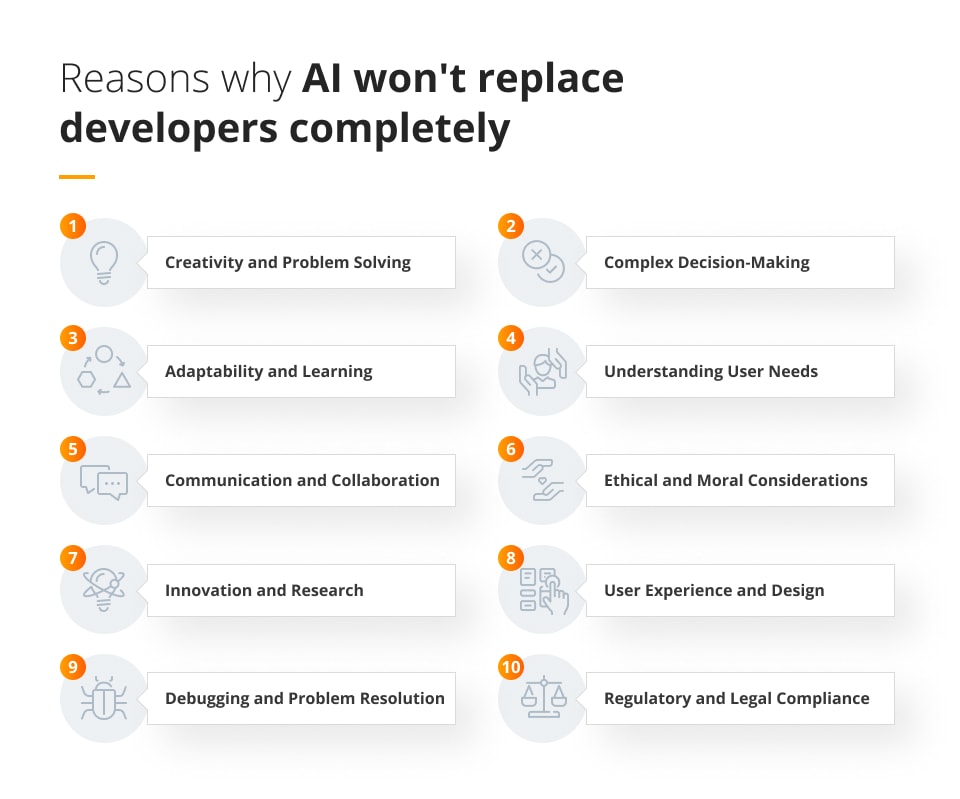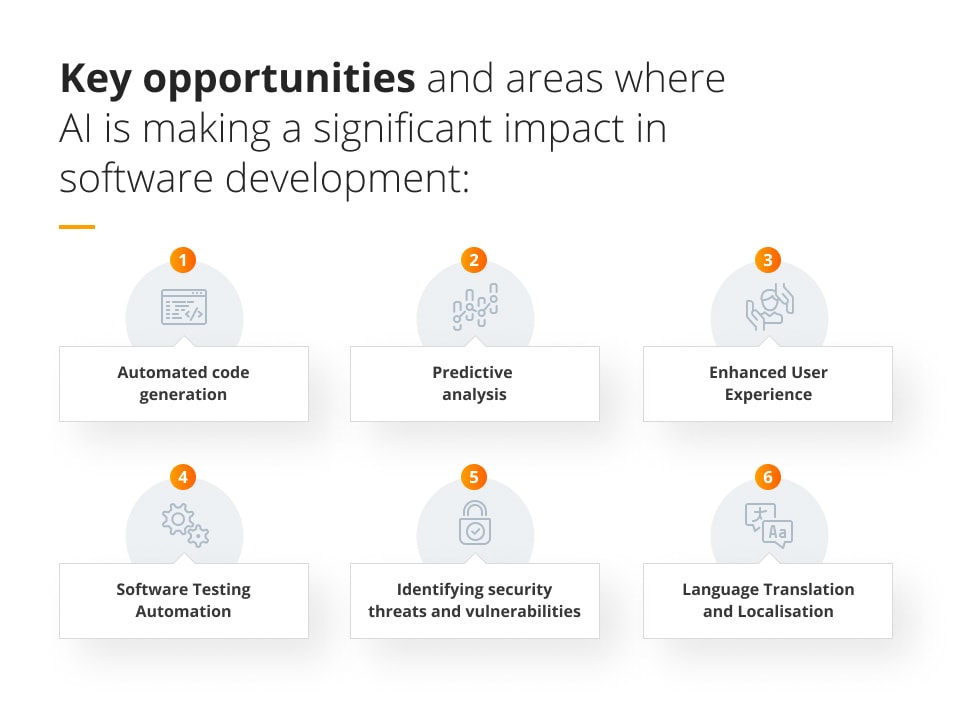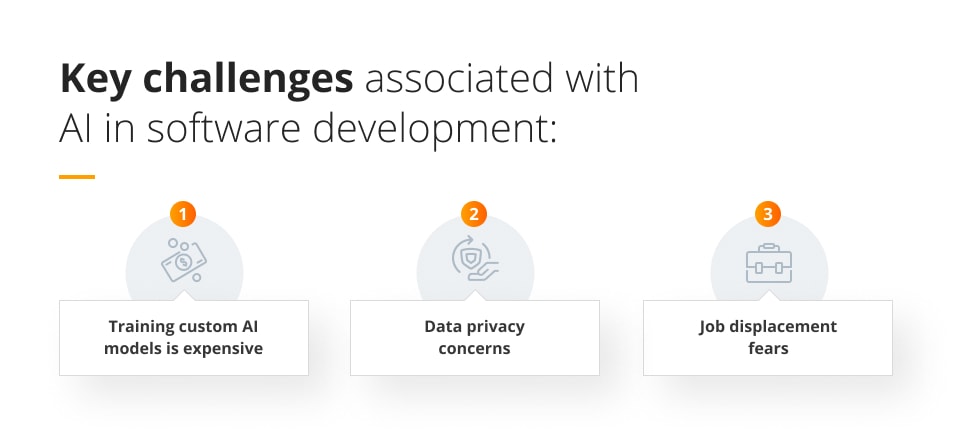
The impact of AI on software development: opportunities and challenges
What is AI-augmented software development? Will it ever replace software developers? Let's find out.
What is AI-augmented software development?
AI-augmented software development refers to the integration of artificial intelligence (AI) technologies and techniques into the software development process to enhance productivity, efficiency, and the quality of software applications.
This approach leverages AI and machine learning to automate tasks, make data-driven decisions, and provide intelligent insights throughout the software development lifecycle.
The game changer: how AI is redefining software development?
Because of the many aspects it encompasses, AI is a proper game changer when it comes to software development. It is transforming the development processes by increasing efficiency, improving code quality, enhancing collaboration, and enabling developers to focus on higher-level tasks.
This evolution is leading to faster development cycles, reduced costs, and the creation of more reliable and innovative software solutions, ultimately redefining how software is conceived, built, and maintained.
AI for programmers: will AI replace software developers?
AI has the potential to automate many aspects of software development, making the process more efficient and assisting software developers in various tasks.
However, it is unlikely AI will completely replace software developers in the foreseeable future – it is more likely it will augment and assist developers in their work.
Here are some reasons why:
- Creativity and problem solving
Software development often involves creative problem-solving, designing innovative solutions, and making decisions that require human intuition and expertise. While AI can assist in automating routine tasks, it lacks the creativity and critical thinking abilities of humans. - Complex decision-making
Many software development decisions are complex and require a deep understanding of business requirements, user needs, and technical constraints. AI can provide data-driven insights, but human judgment is crucial in making decisions that consider the broader context. - Adaptability and learning
AI systems are limited to the knowledge and training data they have received. Software development is a dynamic field, and developers need to continually learn and adapt to new technologies, tools, and methodologies. Humans excel in their ability to learn and stay up-to-date. - Understanding user needs
Understanding and empathising with user needs, preferences, and experiences is a human skill that is difficult for AI to replicate. Developers play a crucial role in creating user-centric software. - Communication and collaboration
Effective communication and collaboration are essential in software development, especially when working in teams or with clients. Humans excel in interpersonal skills and teamwork, which are challenging for AI to replicate. - Ethical and moral considerations
Making ethical and moral decisions in software development, such as addressing bias in algorithms or considering the impact of technology on society, requires human judgment and values. - Innovation and research
Software development often involves pushing the boundaries of technology and conducting research. AI can assist in research tasks, but breakthrough innovations typically come from human creativity and curiosity. - User Experience and design
While AI can analyse data and provide insights, the design of user interfaces and user experiences requires human creativity and an understanding of aesthetics and usability. - Debugging and problem resolution
Debugging complex software issues and resolving unexpected problems often require detective work and problem-solving skills that AI currently lacks. - Regulatory and legal compliance
Ensuring that software complies with legal and regulatory requirements, such as data privacy laws, requires human expertise in understanding complex legal frameworks.
AI in software development: opportunities
AI presents numerous opportunities in software development, revolutionising the way software is designed, built, and maintained.
Here are some key opportunities and areas where AI is making a significant impact in software development:
Automated code generation
AI-powered code generators can automate the creation of code snippets, modules, and even entire applications, significantly speeding up development.
Predictive analysis
AI can analyse historical project data to predict project timelines, resource requirements, and potential risks, aiding in project management and planning.
Enhanced User Experience
AI-driven chatbots can provide developer support, answer questions, and offer guidance on coding issues and best practices, making the User Experience much better.
Software testing automation
AI can automate various types of testing, including unit testing, integration testing, and user acceptance testing, leading to more comprehensive testing coverage.
Identifying security threats and vulnerabilities
AI algorithms can automatically detect and categorise bugs and issues in code, making it easier for developers to identify and fix problems.
AI-based security solutions proactively identify and mitigate security vulnerabilities in software applications, improving overall security.
Language translation and localisation
AI-powered translation and localisation tools help make software accessible to global audiences by automating language translation and cultural adaptation.
AI in software development: challenges
While AI offers numerous benefits in software development, it also presents several challenges that need to be addressed for successful implementation.
Here are some key challenges associated with AI in software development:
Training custom AI models is expensive
Training custom AI models can be expensive, and this cost is one of the significant challenges in AI-driven software development.
Several factors contribute to the expense of training custom AI models, such as data collection and preparation, computing resources, expertise, training time, hyper parameter tuning and infrastructure maintenance.
The potential benefits however, such as improved performance, competitive advantages, and innovation, may justify the investment. Careful planning, resource allocation, and cost management are essential to navigate the challenges associated with custom AI model training effectively.
Data privacy concerns
Handling sensitive data raises privacy and security concerns.
Developers must implement robust security measures to protect data used for AI training and inference, while organisations should carefully plan AI projects, invest in education and training, and establish clear ethical and governance frameworks to ensure responsible and successful AI integration into software development processes.
Job displacement fears
The fear of job displacement due to AI in software development is a valid concern and a significant challenge.
Addressing those fears requires a combination of individual and organisational efforts: individuals should proactively seek opportunities for upskilling and reskilling, companies should invest in employee raising and development programmes, while government and education institutions can play a role in providing resources and programs to help individuals acquire AI-related skills.
Mastering the AI-driven software development: turn challenges into opportunities
Mastering AI-driven software development involves recognising the challenges and transforming them into opportunities for innovation and growth.
By addressing all of those challenges proactively and viewing them as opportunities for improvement and innovation, organisations and developers can master AI-driven software development and leverage AI to create more efficient, ethical, and innovative software solutions.
If you are looking for reliable partners to discuss those issues, do get in touch. We will be happy to share our experience and expertise.







